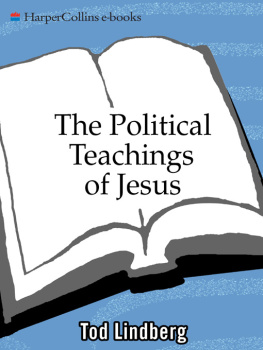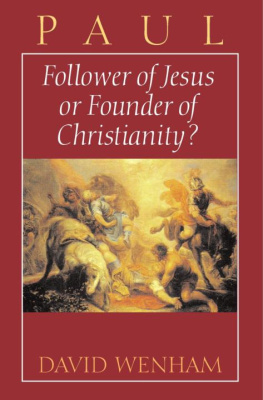This book is about the political (rather than the religious) teachings of Jesushis guidance for people about how to live in this world and how to build a just society among and for themselves. Ill often refer to this political teaching as the Jesusian teaching (which I pronounce jay-SOO-sian ) in order to distinguish that aspect of what Jesus had to say from the Christian religious teaching pertaining to such matters as the immortality of the soul, divine judgment, salvation and damnation, and so on. In the Introduction that follows, Ill say a little more about the relationship of the political teaching and the religious teaching and why I think it is both possible and valuable to examine the political teaching on its own terms. Here, I would like to clarify the sense in which politics is at issue.
The detailed exploration of the political teachings of Jesus readers will find here is very different from the deployment of the Christian Gospels in support of a contemporary political agenda. People sometimes find it convenient to dip into the Bible to search for material that seems to support their views or undermine their opponents views on matters of current partisan controversy. We will not be doing that here.
I want to be perfectly explicit on this point: Jesus was neither a progressive Democrat bent on income redistribution nor a neoconservative Republican promoting a radical democracy agenda. It is impossible to determine from the Gospels whether Jesus would favor or oppose private accounts for Social Security. Jesus did not address the question of what the optimal rate of taxation of capital gains is. In my view, mining the New Testament for insight into such questions is anachronisticand worse than useless. In how many cases has someone with a political agenda consulted scripture only to have scripture reveal that his or her agenda is all wrong?
Such exercises have the perverse effect of introducing even more distance between ourselves and a fuller understanding of what Jesus had to say. The Jesusian teaching is extraordinarily rich in content, and it does indeed have profound implications down to our time. But to fully appreciate it, we need to broaden our understanding of what politics is from the set of political questions that confront twenty-first-century Americans.
While it is unreasonable to call Jesus a progressive in the context of modern American politics, it is entirely reasonable to call Jesus the progressive in the context of his dayand in that sense, ever since. Into a world of imperial occupation, deprivation, cruelty, slavery, injustice, hereditary privilege, persecution, tribal conflict, collective punishment, piracy, the arrogance of the strong, the hopelessness of the weak, and the banishment of the sick, Jesus introduced the idea of universal freedom and the equality produced when people recognize the freedom of others by treating others the way they themselves would like to be treated. Dead set against politics based on the rule of the strong, or of an elite, or of the mob, Jesus proposed instead a political order organized on the principle of shared recognition of freedom and equalitya community of goodwill. This basic question of how people should organize worldly affairs to settle their disagreements is the political question at issue in the Jesusian teachingand our subject.
Its my hope that readers will see that the political teaching of Jesus is now widely accepted, though rarely understood as such. On their good days, people in the modern world believe they should live in accordance with universal principles of freedom and equality. They also expect others in their societies to share this view of how to live, and they act accordingly, although they recognize that people have their bad days and do bad things and that some people think they can get away with rejecting their obligations while demanding that others adhere to theirs. The pangs of conscience people sometimes feel when they misbehave come from knowledge that they have failed to live up to this Jesusian guidance. These taken-for-granted elements of modern life frame our current political disputes and mostly prevent them from rising to anything like the level of contentionroutine violent strugglethat politics entailed at the time of Jesus.
No one today can read the Sermon on the Mount and take it the way it fell on the ears of those who first heard it in Galileewho first heard Jesus pronounce that the meek are blessed and shall inherit the earth. For modern readers, there is a paradox: Because the politics of the modern world is substantially Jesusian in character, the influence the political teachings of Jesus have had on us is easy to miss. His teaching comes down to us not only directly, through his own words, but also through various religious and secular filters, from the doctrinal teaching of particular churches to the thought of philosophers indebted to him even if they rebelled against him. Our access to the Jesusian teaching does not begin with hearing a preacher spell out his ideas in a sermon delivered from a hillside or with the formal study of the Gospels, but with the daily activity of our own lives lived in large measure according to principles Jesus espoused. Some of us may be unaware of this influence, or only dimly aware, but it is there. And having enjoyed the benefits of living this way and not anotheras slaves of a cruel tyrant, for instancewe can and should go back and see where this way of living comes from. Because today there are many more people in the world who are free than there were during Jesuss time and because people today mostly believe that all people should be free (at least ideally), they have a leg up on understanding what Jesus meant by saying you will know the truth, and the truth will make you free (Jn. 8:32).
In what follows, readers will find much to take away on the question of how to live their lives and what obligations they have toward other people. The Jesusian teaching remains rich in the insight it provides into the question of how we should approach our relations with others. We will see that when we seek an unfair advantage for ourselves at the expense of others, we are unnecessarily jeopardizing not only their well-being but also our own. We will see guidance on how to structure our relations with others so that a gain for me is a gain for you, too. We will see why it follows from the Jesusian teaching that those who are well-off have a special obligation toward those who are not, why this is true with regard not only to those whose material circumstances are lesser but also to those who find themselves down in the dumps or dispirited, and why the fulfillment of this special obligation is good not only for others but also for those lucky enough to be in a position to incur such obligations.
All this is true even within the modern world, where society operates at a pinnacle of peace and prosperity unfathomable to those of Jesuss time. Yet the politics of daily life-and-death struggle and oppression is still the politics that confronts much of the world today. The modern, Jesusian world is real, and it is robust, but it is hardly the whole world. Indeed, some have sought and some still seek to overturn the foundations of the modern world in the name of one violent and coercive ideology or another, and we need to know how to go about preserving the political achievement the creation of this world represents against its opponents.
The key political challenge of our time is extending the benefits of the political and social world we inhabit to others. In some cases, we will find that this effort of outreach will be met with ready reciprocation, as those to whom we extend a hand quickly understand the benefit of such relations. But, of course, the task is complicated, as it has always been, by the fact that some political actors today are just as resourceful in their ruthlessness and cruelty as some of those in Jesuss time. Jesus, as we shall see, anticipated this problem as well. The most difficult political challenges of our day, though much diminished in scope by the spread of the Jesusian teaching, remain the same as those that Jesus set out to relieve two thousand years ago. A return to the source will both illuminate the success we have had and guide us on the question of what to do next.











